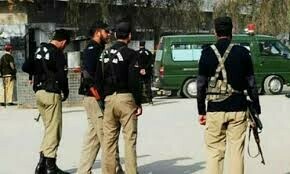LAHORE: A ‘new polio virus’ has been detected from the environmental sample drawn from Multan Road drain of Lahore, putting a good number of children of the provincial capital at risk of contracting the crippling disease.
The health officials were shocked to learn that the lab investigations of the sewage sample could not trace genetic sequencing of the new polio virus which was a rare happening. The report has declared the fresh Lahore sample positive for the polio virus, an official who is close to the information, told Dawn.
He said all the environmental samples of Lahore which were declared positive in 2014 had established the genetic links of the polio virus with either Khyber Pakhtunkhwa or Fata. He said the recent report, however, made it clear that the polio virus was not related to these areas.
Lab analysis could not trace genetic sequencing of virus
Meanwhile, the official further said, the health authorities were already investigating a case in Faisalabad where a 60-month-old baby was suspected to be infected with polio disease. He said though the investigations were under process, if the reports were declared positive, it would be the first polio case of 2015 in Punjab.
“The lab report shows a new polio virus has been circulating in Lahore for the last six months or so and it may infect children particularly those residing in Pakhtun colonies,” Punjab Expanded Programme on Immunisation (EPI) Director Munir Ahmad told this reporter.
He said it never happened in the past as the lab reports had been detecting the genetic sequencing of the polio virus whenever the sewage samples were sent to the National Institute of Health (NIH), Islamabad.
“Though the report is yet to be released, this time the relevant official who analysed the Multan Road Lahore sample has conveyed to us that the sample is infected with polio virus but the lab could not detect its origin,” Mr Munir said.
He said the genetic sequencing of a polio virus played a decisive role for the health experts to stop its further spread by reaching the target population. “If the genetic links of this virus are established with the local virus, it will be unfortunate for us,” he said.
According to the laid down guidelines, sewage samples are being drawn every month from major districts of the province particularly Lahore.
The ‘unusual result’ of the fresh sampling showed that a large number of children was not getting vaccination during the last many anti-polio drives, he said.
“We have conducted so far 10 campaigns during the last some months,” the EPI director said, adding that in the perspective of the new report more efforts were required to reach the missing children in order to prevent them from the virus.
About the Faisalabad case, he said the matter had also disturbed the health authorities. He said the age of the suspected kid was also focus of discussions/investigations as normally the polio wild virus targeted under three-year-old babies. “According to the information so far, the chances of child’s paralysing by the disease were 50 per cent,” Munir Ahmad said.
This particular case was also different in nature due to the age of the suspected child, he said adding that the health department was awaiting completion of its investigation.
To a question, Dr Munir said the health department was starting anti-polio drive in Lahore soon in the perspective of the fresh sewage sample reports.
He declared Pakhtun colonies in Lahore as one of the major concerns of the health department where a majority of the inhabitants was of migrants from KP, Fata and such other areas which had been the hub of the transmission of polio virus to rest of the country.
“Can you imagine one Pakhtun colony located at Walton Road is housing 1,000 families and according to the health department’s information they all are migrants,” he said adding such people were posing a threat to local healthy population of children.
Quoting latest reports, he said Lahore and Rawalpindi were the first priority districts of the health department in Punjab in terms of polio disease.
Published in Dawn, April 13th, 2015
On a mobile phone? Get the Dawn Mobile App: Apple Store | Google Play
















































